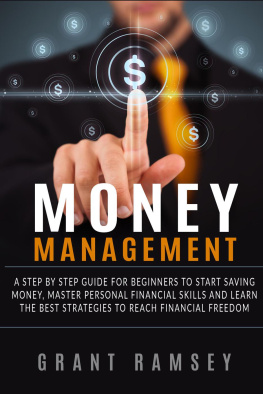Copyright
Copyright 2010 by Morningstar, Inc. All rights reserved.
Published by John Wiley & Sons, Inc., Hoboken, New Jersey.
Published simultaneously in Canada.
Stopwatch courtesy ISTOCK
No part of this publication may be reproduced, stored in a retrieval system, or transmitted in any form or by any means, electronic, mechanical, photocopying, recording, scanning, or otherwise, except as permitted under Section 107 or 108 of the 1976 United States Copyright Act, without either the prior written permission of the Publisher, or authorization through payment of the appropriate per-copy fee to the Copyright Clearance Center, Inc., 222 Rosewood Drive, Danvers, MA 01923, (978) 750-8400, fax (978) 750-4470, or on the web at www.copyright.com. Requests to the Publisher for permission should be addressed to the Permissions Department, John Wiley & Sons, Inc., 111 River Street, Hoboken, NJ 07030, (201) 748-6011, fax (201) 748-6008, or online at www.wiley.com/go/permissions.
Limit of Liability/Disclaimer of Warranty: While the publisher and author have used their best efforts in preparing this book, they make no representations or warranties with respect to the accuracy or completeness of the contents of this book and specifically disclaim any implied warranties of merchantability or fitness for a particular purpose. No warranty may be created or extended by sales representatives or written sales materials. The advice and strategies contained herein may not be suitable for your situation. You should consult with a professional where appropriate. Neither the publisher nor author shall be liable for any loss of profit or any other commercial damages, including but not limited to special, incidental, consequential, or other damages.
For general information on our other products and services or for technical support, please contact our Customer Care Department within the United States at (800) 762-2974, outside the United States at (317) 572-3993 or fax (317) 572-4002.
Wiley also publishes its books in a variety of electronic formats. Some content that appears in print may not be available in electronic books. For more information about Wiley products, visit our web site at www.wiley.com.
Library of Congress Cataloging-in-Publication Data:
Benz, Christine.
30-minute money solutions : a step-by-step guide to managing your finances/Christine Benz.
p. cm.
Includes index.
ISBN 978-0-470-48157-8 (cloth)
1. Finance, Personal. 2. Investments. I. Morningstar, Inc. II. Title. III. Title: 30-minute money solutions. IV. Title: Thirty-minute money solutions.
HG179.B424 2010
332.024dc22
2009041412
Printed in the United States of America
10 9 8 7 6 5 4 3 2 1
Foreword
You'd think that managing your own money would be the most elemental of life skills, one we would all master at an early age. You work and are paid money. You spend some and save the rest. You invest some of what you save for higher returns in the future in case you can't work then. It doesn't sound like that difficult a set of skills to develop. Certainly, most of us develop much more complex capabilities for social interaction: how we dress, behave in public, develop a sense of humor, choose friends, maintain relationships, find employment, select a place to live, and so forth. Compared with that, personal finance should be a breeze.
Yet for most people personal finance remains a mystery, leaving far too many of us prone to scams that play on our navet. Small wonderfor most of us, the subject of saving and investing wasn't something discussed at home while we were growing up. It most certainly wasn't something taught in our schools. And to compound the problem, the financial services industry seemingly goes out of its way to make the topic impenetrable. What other industry has more needless complexity and more confusing and constantly changing terminology? Did your Fannie Mae ARM get turned into an RMBS or a CMO with a long WAM rated by a NRSRO and sold to a convert/arb shop?
Fortunately, it is possible to cut through the nonsense and forge a sound financial path, even if you're not hip to this week's financial acronym. The basics of personal finance are just that: basic. Buy low, sell high; live within your means; understand your time horizon; set reasonable goalsthese are all simple concepts that can be readily grasped and, with effort, mastered by all of us. All you need is a good coach to help you cut through the clutter and keep you on target. 30-Minute Money Solutions is designed to be just such a guide to get you started or to help you brush up on individual tasks such as saving for college or rolling over a 401(k) plan.
I can think of no finer guide for conquering these tasks than Christine Benz. Christine is a gifted financial analystas talented as any we've ever had at Morningstar. She quickly rose through the ranks as an analyst to become director of all our mutual fund analysts. Under her leadership, the team did groundbreaking work and Christine nurtured a team of fine young analysts into seasoned pros. Following the typical Morningstar career path, Christine was poised to run a business unit or to take a central role in corporate management, but she chose to follow her heart. She recognized that her first love was helping investors, so she opted to become Morningstar's in-house financial-planning expertand she's really run with that mandate, editing our PracticalFinance newsletter and contributing regularly to Morningstar.com.
Christine recognizes what far too many people in financial services forgetthat it's all about the individual investor. If the investor doesn't win, everyone in and around the investment process has failed, no matter how big a bonus some investment banker or bond trader may walk away with. Personal finance is about people. Helping people navigate this terrain and meet their goals is Christine's passion. You'll see that concern and the human element throughout this book, which centers on real issues faced by real investors. I truly believe that 30-Minute Money Solutions will help you take control of your financial life and master the elemental skill of personal finance. And by doing that, you'll put your family's security and your own dreams on firmer footing, something we would all define as a winning outcome.
Don Phillips
Managing Director
Morningstar, Inc.
Preface
Investors are motivated by fear and greed, the saying goes. But I saw another emotion on display in the 2008 bear market: grief. And it played out exactly the way psychiatrist Elisabeth Kbler-Ross documented back in the late 1960s.
The first stage, denial, was widespread during the late 2007 through early 2009 downturn. Countless friends, colleagues, and Morningstar readers told me that they weren't opening their investment statements, as if not seeing their losses in black and white would make it all go away.
Others got angry (the next stage), and there were certainly plenty of targets available during the recent debacle. Choose your culprit: reckless lenders, greedy investment firms, and consumers signing up for loans that they knew they couldn't possibly afford. All had a hand in causing the worst stock market calamity since the Great Depression.
Bargaining is the next phase, and while it's less common than the other stages of the grief process, I've seen that in action, too. Many investors have told me that they're hanging on to stocks that they know are too risky for them in the hope of getting back to the price where they bought them. Another couple in their early sixties acknowledged that they have too much of their retirement kitty in stocks but they're determined to hang on. They say that they'll switch to a more age-appropriate mix just as soon as their portfolio gets back to the high point it scaled in 2007.









